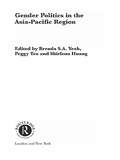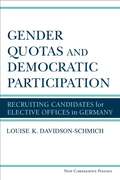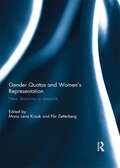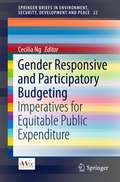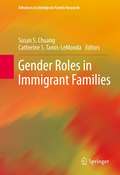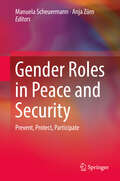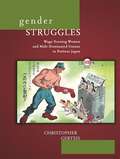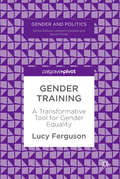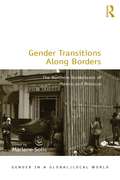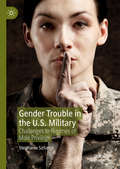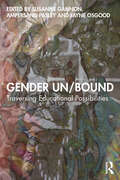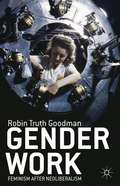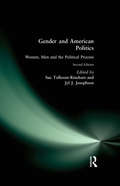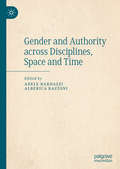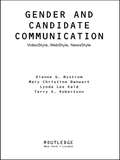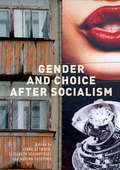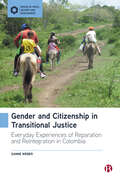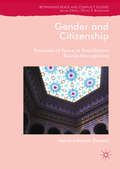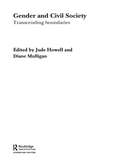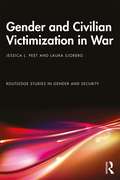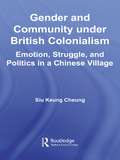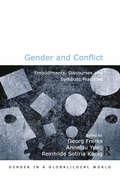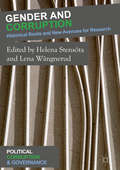- Table View
- List View
Gender Politics in the Asia-Pacific Region (Routledge International Studies of Women and Place #No.3)
by Brenda S.A. Yeoh Peggy Teo Shirlena HuangAmidst the unevenness and unpredictability of change in the Asia-Pacific region, women's lives are being transformed. This volume takes up the challenge of exploring the ways in which women are active players, collaborators, participants, leaders and resistors in the politics of change in the region. The editors focus attention on the politics of gender as a mobilizing centre for identities, and the ways in which individualized identity politics may be linked to larger collective emancipatory projects based on shared interests, practical needs, or common threats. Collectively, the chapters illustrate the complexity of women's strategies, the diversity of sites for action, and the flexibility of their alliances as they carve out niches for themselves in what are still largely patriarchal worlds. This book will be of vital interest to scholars in a range of subjects, including gender studies, human geography, women's studies, Asian studies, sociology and anthropology.
Gender Quotas and Democratic Participation
by Louise K. Davidson-SchmichSince the 1970s, quotas for female political candidates in elections have proliferated worldwide. Beyond increasing the numbers of women in high-level elected bodies and, thereby, women's political representation, advocates claim that quotas foster gender-equal participation in democracy and create female role models. According to this reasoning, quotas also overcome barriers to women's political participation, especially discriminatory practices in the selection of electoral candidates. Though such claims have persuaded policymakers to adopt quotas, little empirical evidence exists to verify their effects. In Gender Quotas and Democratic Participation, Louise K. Davidson-Schmich employs a pathbreaking research design to assess the effects of gender quotas on all phases of political recruitment. Drawing on interviews with, and an original survey of, potential candidates in Germany, she investigates the extent to which quotas and corresponding increases in women's descriptive representation have resulted in similar percentages of men and women joining political parties, aspiring to elected office, pursuing ballot nominations, and securing selection as candidates. She also examines the effect of quotas on discriminatory selection procedures. Ultimately, Davidson-Schmich argues, quotas' intended benefits have been only partially realized. Quotas give women greater presence in powerful elected bodies not by encouraging female citizens to pursue political office at rates similar to men's, but by improving the odds that the limited number of politically ambitious women who do join parties will be elected. She concludes with concrete, original policy recommendations for increasing women's political participation. Book jacket.
Gender Quotas and Women's Representation: New Directions in Research
by Mona Lena Krook and Pär ZetterbergElectoral gender quotas have emerged as one of the most critical political reforms of the last two decades, having now been introduced in more than 130 countries worldwide. The recent and global nature of these developments has sparked both scholarly and popular interest in the in which these quotas are designed, as well as their origins and effects. This volume seeks to expand these existing agendas to forge new directions in research on gender quotas and political representation. The topics considered include new paths to adoption, as well as – in the wake of quota introduction – changes in the dynamics of candidate selection, the status and role of women in legislative institutions, and the impact that women have on policy-making. Expanding the scope of quota studies, the contributions also address trends in different political parties and different levels of government, the effectiveness of quotas in democratic and non-democratic settings, and whether there might be non-quota mechanisms that could be pursued together with, or in lieu of, gender quotas in order to increase women’s political representation. This book was originally published as a special issue of Representation.
Gender Responsive and Participatory Budgeting
by Cecilia NgThis unique book focuses on the hybridization of grassroots participation in planning, implementing, and developing gender-responsive budgeting. It explores the possibilities for gender sensitive budgeting when implemented using techniques that have been popularized by participatory governance activists. A combination of the two allows for a whole new way of ensuring public budgets are used equitably.
Gender Responsive and Participatory Budgeting: Imperatives for Equitable Public Expenditure (SpringerBriefs in Environment, Security, Development and Peace #22)
by Cecilia NgThis unique book focuses on the hybridization of grassroots participation in planning, implementing, and developing gender-responsive budgeting. It explores the possibilities for gender sensitive budgeting when implemented using techniques that have been popularized by participatory governance activists. A combination of the two allows for a whole new way of ensuring public budgets are used equitably.
Gender Revolution: How Electoral Politics and #MeToo are Reshaping Everyday Life
by Pamela Aronson Matthew R. FlemingGender Revolution carefully examines the profound transformations happening in both public and private arenas of gender relations. It also draws critical attention to the simultaneous and potent challenges that have risen in response. The authors look to large-scale phenomena in this contemporary study and address how electoral politics and the #MeToo movement are reshaping everyday life. This gender revolution has led to a culture in which women, and increasing numbers of men, refuse to accept traditional gender norms and gender inequalities. People of all genders no longer tolerate abuses of power in politics or in their interpersonal relationships. Despite vigorous resistance, women are seizing power and refusing to back down, in ways both large and small. The authors note on the one hand that people of all genders in support of these transformations are voting for progressive candidates, engaging on social media, and making their interpersonal relationships more equal. On the other hand, they document considerable backlash and contestation, as some people are resisting these changes and creating adversarial gender divisions. Probing across these issues, the book develops an analysis of gendered social and cultural change that reveals how movement ideas diffuse into broader culture. Gender Revolution presents a vibrant and essential study for a moment marked by significant changes to attitudes, beliefs, and views surrounding gender and gender relations and will appeal to readers interested in the scholarly study of gender, society, politics, media, law, and culture.
Gender Roles in Immigrant Families
by Susan S. Chuang Catherine S. Tamis-LeMondaResearchers recognize that theoretical frameworks and models of child development and family dynamics have historically overlooked the ways in which developmental processes are shaped by socio-cultural contexts. Ecological and acculturation frameworks are especially central to understanding the experiences of immigrant populations, and current research has yielded new conceptual and methodological tools for documenting the cultural and developmental processes of children and their families. Within this broad arena, a question of central importance is on how gender roles in immigrant families play out in the lives of children and families. Gender Roles in Immigrant Families places gender at the forefront of the research by investigating how it interplays with parental roles, parent-child relationships, and child outcomes.
Gender Roles in Peace and Security: Prevent, Protect, Participate
by Manuela Scheuermann Anja ZürnThis volume examines the specific gender roles in peace and security. The authors analyse the implementation process of United Nations Security Council Resolution 1325 in various countries and discuss systemic challenges concerning the Women, Peace and Security agenda. Through in-depth case studies, the authors shed new light on topics such as the gender-related mechanisms of peace processes, gender training practices for police personnel, and the importance of violence prevention. The volume studies the role of women in peace and security as well as questions of gender mainstreaming by adopting various theoretical concepts, including feminist theories, concepts of masculinity, organizational and security studies. It also highlights regional and transnational approaches for the implementation of the Women, Peace and Security agenda, namely the perspectives of the European Union, NATO, the UN bureaucracy and the civil society. It presents best cases and political advice for tackling the problem of gender inequality in peace and security.
Gender Struggles: Wage-Earning Women and Male-Dominated Unions in Postwar Japan (Harvard East Asian Monographs #321)
by Christopher GerteisIn the formative years of the Japanese labor movement after World War II, the socialist unions affiliated with the General Council of Trade Unions (the labor federation known colloquially as Sohyo) formally endorsed the principles of women’s equality in the workforce and put in place measures to promote women’s active participation in union activities. However, union leaders did not embrace the legal framework for gender equality mandated by their American occupiers; rather, they pressured thousands of women labor activists to assume supportive roles that privileged a male-centered social agenda. By the late 1950s, even Japan’s radical socialist unions had reestablished the primacy of conservative gender norms, channeling women’s labor activism to support political campaigns that advantaged a male-headed household and that relegated women’s wage-earning value to the periphery of the household economy.By showing how unions raised the wages of male workers in part by transforming working-class women into middle-class housewives, Christopher Gerteis demonstrates that organized labor’s discourse on womanhood not only undermined women’s status within the labor movement but also prevented unions from linking with the emerging woman-led, neighborhood-centered organizations that typified social movements in the 1960s—a misstep that contributed to the decline of the socialist labor movement in subsequent decades.
Gender Training: A Transformative Tool for Gender Equality (Gender and Politics)
by Lucy FergusonThis book develops a case for feminist gender training as a catalyst for disjuncture, rupture and change. Chapter 1 traces the historical development and current contours of the field of gender training. In Chapter 2, the key critiques of gender training are substantively engaged with from the perspective of reflexive practice, highlighting the need to work strategically within existing constraints. Questions of transformative change are addressed in Chapter 3, which reviews feminist approaches to change and how these can be applied to enhance the impact of gender training. Chapter 4 considers the theory and practice of feminist pedagogies in gender training. In the final chapter, new avenues for gender training are explored: working with privilege; engaging with applied theatre; and mindfulness/meditation. The study takes gender training beyond its often technocratic form towards a creative, liberating process with the potential to evoke tangible, lasting transformation for gender equality.
Gender Transitions Along Borders: The Northern Borderlands of Mexico and Morocco (Gender in a Global/Local World)
by Marlene SolisIn recent decades, women living in border cities have taken on new roles and have become one of the most vulnerable population groups; experiencing the effects of the economic crisis of the early 21st century and the consequent increase in social inequality and violence. This situation is particularly evident for the northern borderlands of Mexico and Morocco. The geopolitical position of these regions is defined by their strong existing asymmetry with their neighbouring countries: the United States, in the case of Mexico, and the Mediterranean European countries, in the case of Morocco. This book contributes to the understanding of current changes in the workplace, in family, in sexuality and sexual violence within the setting of the borderlands, through various studies addressing the manner in which these transformations are interpreted and experienced by women in everyday life and in their individual and collective agency.
Gender Trouble in the U.S. Military: Challenges to Regimes of Male Privilege
by Stephanie SzitanyiThis book investigates challenges to the U.S. military’s gender regime of hetero-male privilege. Examining a broad set of discursive maneuvers in a series of cases as focal points—integration of open homosexuality, the end of the combat ban on women, and the epidemic nature of military sexual assault within its units—Stephanie Szitanyi examines the contemporary link between gender and military service in the United States, and comprehensively analyzes forms of gendering produced by the military as an institution. Using feminist interpretivist methods to analyze an impressive combination of visual, textual, archival, and cultural materials, the book argues that despite policy changes since 2013 that may be positioned as explicit episodes of degendering, military officials have simultaneously moved to counteract them and reinforce the institution’s gender regime of hetero-male privilege. Importantly, these (re)gendering processes continue to prioritize certain forms of service and sacrifice, through which a specific version of masculinity—the masculine warrior—is continuously promoted, preserved, and cemented.
Gender Un/Bound: Traversing Educational Possibilities
by Jayne Osgood Susanne Gannon Ampersand PasleyThis collection is focused on the possibilities for unbinding people from gendered expectations in and around educational spaces, and accounts for the ways gender is reconstituted in and through education.This book presents a broad interpretation of gender, of what education might mean, and where educational experiences manifest. It explores more conventional schooling spaces to communally generated inclusive spaces, families and marginalised sites where gender is realised and contested. Alongside more familiar framings, the book incorporates decolonial and Indigenous contestations, theoretical innovations and methodological experiments that pry open the ways that gender binds and limits individuals. The chapters are organised in smaller conceptual clusters, offering multiple and overlapping reading paths according to the interests of the reader. A mapping of clusters and potential reading paths is included at the opening of the book, designed for instructors to expand course content.Written to enrich reading for preservice teacher education students and to challenge researchers, postgraduate and doctoral candidates, this book provides essential new perspectives on gender, education and the various ways in which they are un/bound together and apart.
Gender Work
by Robin Truth GoodmanRecently, labor has acquired a re-emergent public relevance. In response, feminist theory urgently needs to reconsider the relationship between labor and gender. This book builds a theoretically-informed politics about changes in the gendered structure of labor by analyzing how the symbolic power of gender is put in the service of neoliberal practices. Goodman traces the cultural contextualization of 'women's work' from its Marxist roots to its current practices. From the income gap to the gendering of industries, Goodman explores and critiques the rise of corporate power under neoliberalism and the ways and whys that femininity has become one of its principle commodities.
Gender and American Politics: Women, Men and the Political Process
by Sue Tolleson-Rinehart Jyl J JosephsonStudies of gender and American political life most often focus only on women. This book fills the gap by examining and comparing the roles and behavior of both men and women in political decision-making, public policy, and political institutions. Now updated and expanded, the book presents a full complement of empirical studies of real and imagined gender gaps. New to this edition are chapters on the media, legislative behavior, foreign policy, and the future of the gender dimension in American politics. The book is structured to parallel the typical course on the American political system.
Gender and Authority across Disciplines, Space and Time
by Adele Bardazzi Alberica BazzoniThis edited collection investigates the relationship between gender and authority across geographical contexts, periods and fields. Who is recognized as a legitimate voice in debate and decision-making, and how is that legitimization produced? Through a variety of methodological approaches, the chapters address some of the most pressing and controversial themes under scrutiny in current feminist scholarship and activism, such as pornography, political representation, LGBTI struggles, female genital mutilation, the #MeToo movement, abortion, divorce and consent. Organized into three sections, “Politics,” “Law and Religion,” and “Imaginaries,” the contributors highlight formal and informal aspects of authority, its gendered and racialized configurations, and practices of solidarity, resistance and subversion by traditionally disempowered subjects. In dialogue with feminist scholarship on power and agency, the notion of authority as elaborated here offers a distinctive lens to critique political and epistemic foundations of inequality and oppression, and will be of use to scholars and students across gender studies, sociology, politics, linguistics, theology, history, law, film, and literature.
Gender and Candidate Communication: VideoStyle, WebStyle, NewStyle (Gender Politics--Global Issues)
by Lynda Lee Kaid Dianne G. Bystrom Mary Christine Banwart Terry A. RobertsonFirst published in 2004. Routledge is an imprint of Taylor & Francis, an informa company.
Gender and Choice after Socialism
by Lynne Attwood Elisabeth Schimpfössl Marina YusupovaThe end of socialism in the Soviet Union and its satellite states ushered in a new era of choice. Yet the idea that people are really free to live as they choose turns out to be problematic. Personal choice is limited by a range of factors such as a person’s economic situation, class, age, government policies and social expectations, especially regarding gender roles. Furthermore, the notion of free choice is a crucial feature of capitalist ideology, and can be manipulated in the interests of the market. This edited collection explores the complexity of choice in Russia and Ukraine. The contributors explore how the new choices available to people after the collapse of the Soviet Union have interacted with and influenced gender identities and gender, and how choice has become one of the driving forces of class-formation in countries which were, in the Soviet era, supposedly classless. The book will of interest to students and scholars across a range of subjects including gender and sexualities studies, history, sociology and political science.
Gender and Citizenship in Transitional Justice: Everyday Experiences of Reparation and Reintegration in Colombia
by Sanne WeberThrough two Colombian case studies, Sanne Weber identifies the ways in which conflict experiences are defined by structures of gender inequality, and how these could be transformed in the post-conflict context. The author reveals that current, apparently gender-sensitive, transitional justice (TJ) and disarmament, demobilization and reintegration (DDR) laws and policies ultimately undermine rather than transform gender equality and, consequently, weaken the chances of achieving holistic and durable peace. To overcome this, Weber offers an innovative approach to TJ and DDR that places gendered citizenship as both the starting point and the continued driving force of post-conflict reconstruction.
Gender and Citizenship: Promises Of Peace In Post-dayton Bosnia-herzegovina (Rethinking Peace and Conflict Studies)
by Maria-Adriana DeianaThis book examines the remaking of women’s citizenship in the aftermath of conflict and international intervention. It develops a feminist critique of consociationalism as the dominant model of post-conflict governance by tracking the gendered implications of the Dayton Peace Agreement. It illustrates how the legitimisation of ethnonationalist power enabled by the agreement has reduced citizenship to an all-encompassing logic of ethnonational belonging and implicitly reproduced its attendant patriarchal gender order. Foregrounding women’s diverse experiences, the book reveals gendered ramifications produced at the intersection of conflict, ethno-nationalism and international peacebuilding. Deploying a multidimensional feminist approach centred around women’s narratives of belonging, exclusion, and agency, this book offers a critical interrogation of the promises of peace and explores individual/collective efforts to re-imagine citizenship.
Gender and Civil Society: Transcending Boundaries (Routledge Advances in International Relations and Global Politics)
by Jude Howell Diane MulliganOver the last two decades there has been considerable enthusiasm for the concept of civil society amongst researchers, practitioners and activists. Yet despite this enthusiasm for the concept, the gendered nature of civil society and the impact of feminist organizing on civil society has received minimal attention.This edited volume seeks to address this gap, and considers:* how the political environment and nature of the state shapes the way women organize, the issues they address, and their capacity to affect changes in state policies on gender* is the women's movement structurally different from other civil society organizations?* does the gender lens alter our vision of civil society?The chapters in this volume pursue two or more of these questions and cover a diversity of contexts, including the US, East and Central Europe, China, the Middle East, Africa, South East Asia, Central America and Chile. This book not only draws together the concepts of gender and civil society, but also adopts an international perspective, highlighting the diverse trajectories of women organizing in different country contexts and the historical, cultural and political specificities of civil society.
Gender and Civilian Victimization in War (Routledge Studies in Gender and Security)
by Laura Sjoberg Jessica L. PeetThis book explores the role of gender in influencing war-fighting actors’ strategies toward the attack or protection of civilians. Traditional narratives suggest that killing civilians intentionally in wars happens infrequently and that the perpetration of civilian targeting is limited to aberrant actors. Recently, scholars have shown that both state and non-state actors target civilians, even while explicitly deferring to the civilian immunity principle. This book fills a gap in the accounts of how civilian targeting happens and shows that these actors are in large part targeting women rather than some gender-neutral understanding of civilians. It presents a history of civilian victimization in wars and conflicts and then lays out a feminist theoretical approach to understanding civilian victimization. It explores the British Blockade of Germany in World War I, the Soviet ‘Rape of Berlin’ in World War II, the Rwandan genocide, and the contemporary conflict in northeast Nigeria. Across these case studies, the authors lay out that gender is key to how war-fighting actors understand both themselves and their opponents and therefore plays a role in shaping strategic and tactical choices. It makes the argument that seeing women in nationalist and war narratives is crucial to understanding when and how civilians come to be targeted in wars, and how that targeting can be reduced. This book will be of much interest to students of critical security, gender studies, war studies, and International Relations in general.
Gender and Community Under British Colonialism: Emotion, Struggle and Politics in a Chinese Village (East Asian Studies)
by Siu Keung CheungGender and Community Under British Colonialism is a study of continuity and change in village communities in the New Territories of Hong Kong, China.
Gender and Conflict: Embodiments, Discourses and Symbolic Practices (Gender in a Global/Local World)
by Georg Frerks Annelou YpeijThrough an in-depth analysis of the multifaceted manifestations of gender and conflict, this book shows how cognition and behaviour, agency and victimization, are gendered beyond the popular stereotypes. Conflict not only reconfirms social hierarchies and power relations, but also motivates people to transgress cultural boundaries and redefine their self-images and identities. The contributions are a mix of classical ethnography, performance studies and embodiment studies, showing ’emotions and feelings’ often denied in scientific social research. Strong in their constructivist approach and unorthodox in theory, the articles touch upon the dynamic relation between the discourses, embodiments and symbolic practices that constitute the gendered world of conflict. The localities and research sites vary from institutional settings such as a school, rebel movements, public toilets and the military to more artistic domains of gendered conflicts such as prison theatre classes and the capoeira ring. At the same time, these conflicts and domains appropriate wider discourses and practices of a global nature, demonstrating the globalised and institutionalised nature of the nexus gender-conflict. A first set of chapters deals with ’breaking the gender taboos’ and renegotiating the stereotypical gender roles - masculinities or femininities - during conflict. A second set of chapters focuses more explicitly on the bodily experience of conflict either physically of symbolically, while the last set straddle body and narrative. The inductive quality of the work leads to unexpected insights and does give access to worlds that are new, and often surprising and unconventional.
Gender and Corruption
by Helena Stensöta Lena WängnerudThe link between gender and corruption has been studied since the late 1990s. Debates have been heated and scholars accused of bringing forward stereotypical beliefs about women as the “fair” sex. Policy proposals for bringing more women to office have been criticized for promoting unrealistic quick-fix solutions to deeply rooted problems. This edited volume advances the knowledge surrounding the link between gender and corruption by including studies where the historical roots of corruption are linked to gender and by contextualizing the exploration of relationships, for example by distinguishing between democracies versus authoritarian states and between the electoral arena versus the administrative branch of government—the bureaucracy. Taken together, the chapters display nuances and fine-grained understandings. The book highlights that gender equality processes, rather than the exclusionary categories of “women” and “men”, should be at the forefront of analysis, and that developments strengthening the position of women vis-à-vis men affect the quality of government.
